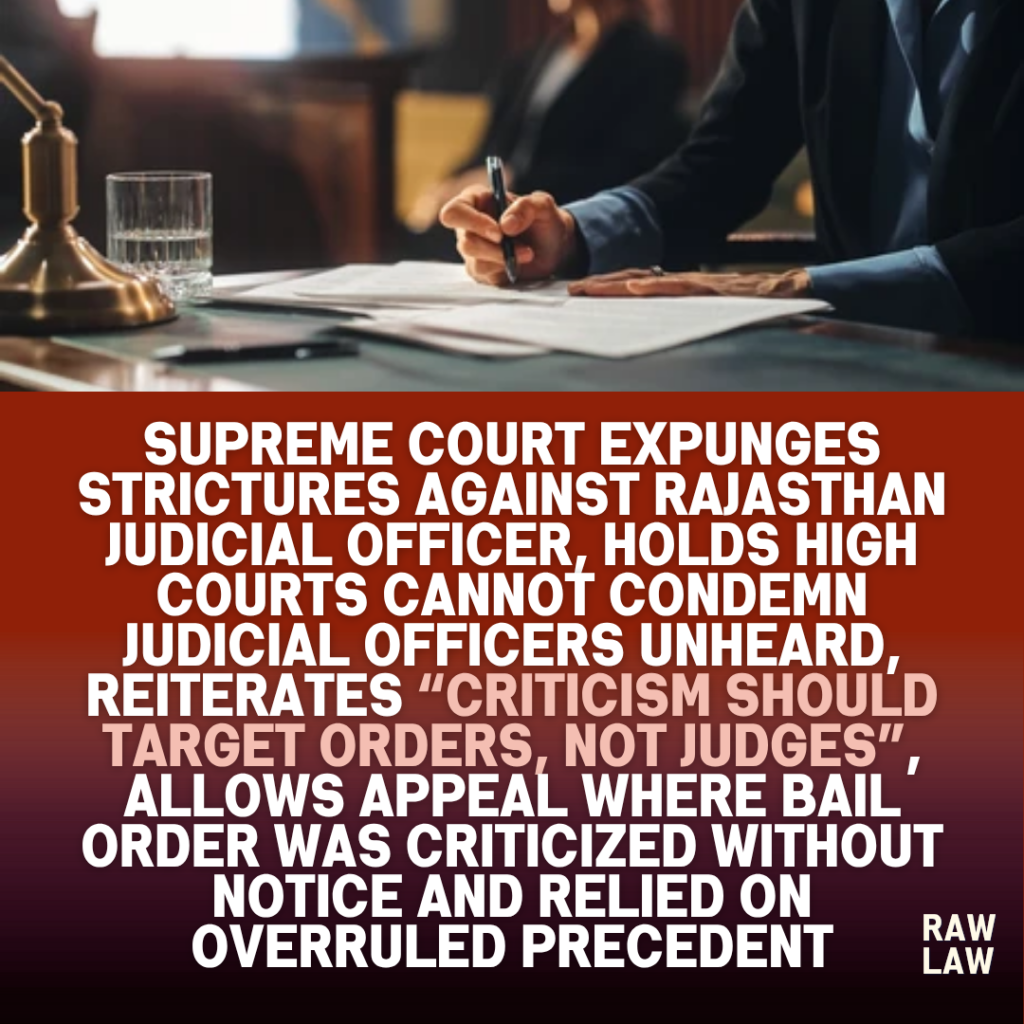Court’s Decision
The Supreme Court allowed the appeal filed by a judicial officer of the Rajasthan District Judiciary and expunged strictures passed against him by the Rajasthan High Court. The Court held that the High Court acted improperly by condemning the officer without granting an opportunity to be heard, relying on a precedent which was subsequently overturned. The Court emphasized that while erroneous orders may be criticized, personal strictures against judicial officers must be avoided unless the officer is given a fair hearing. Additionally, the Court directed all High Courts to consider adopting a rule mandating disclosure of criminal antecedents by accused persons in bail applications.
Facts
The case arose from a criminal bail matter involving allegations of serious offenses under the Indian Penal Code. The judicial officer had granted bail to an accused while functioning as a Link Sessions Judge. Subsequently, the High Court criticized the officer, attributing negligence and indiscipline in bail adjudication, mainly for failing to consider the accused’s criminal antecedents and alleged status as the principal offender. The officer approached the Supreme Court challenging the strictures, contending that he had been condemned without being heard, and that the High Court based its conclusions on an overruled judgment.
Issues
- Whether the High Court was justified in passing personal strictures against a judicial officer without providing an opportunity of hearing.
- Whether a judicial officer can be criticized based on judicial orders without resorting to administrative inquiry.
- Whether reliance on an overruled judgment invalidates the basis of the High Court’s strictures.
Petitioner’s Arguments
The petitioner contended that the High Court erred in criticizing his conduct without notice or opportunity to explain. He submitted that the High Court should have confined itself to correcting the bail order instead of making personal remarks. The petitioner pointed out that the main basis of the High Court’s reasoning, a prior judgment in Jugal’s case, was overturned by the Supreme Court, thereby rendering the criticism fundamentally flawed.
Respondent’s Arguments
While no specific detailed arguments of the State were recorded, the underlying justification for the High Court’s action was based on perceived judicial misconduct in granting bail to a habitual offender without recording necessary reasons and allegedly ignoring the High Court’s binding precedents.
Analysis of the Law
The Court analyzed constitutional principles and judicial discipline governing superior court oversight over subordinate judiciary. It referred to earlier Supreme Court rulings, particularly Re: ‘K’, A Judicial Officer and Sonu Agnihotri v. Chandra Shekhar, emphasizing that High Courts possess disciplinary powers but must exercise them with restraint and fairness. The Supreme Court observed that judicial officers should not be condemned unheard in judicial orders, and adverse comments should be avoided in court judgments unless due process is followed.
Precedent Analysis
The Court extensively relied on Re: ‘K’, A Judicial Officer (2001), which set out the principle that strictures against judicial officers should be avoided on the judicial side. It also relied on Sonu Agnihotri (2024), which reinforced the idea that appellate courts must criticize judgments but refrain from personal attacks on judges. Additionally, the Court highlighted that the High Court’s reliance on Jugal v. State of Rajasthan was misplaced since it had been overruled in Ayub Khan v. State of Rajasthan (2024), rendering the strictures legally unsustainable.
Court’s Reasoning
The Court concluded that condemning a judicial officer in judicial proceedings without notice violates principles of natural justice and causes irreversible reputational harm. It stressed that erroneous judicial decisions should be corrected but criticism of personal conduct must be handled administratively, giving the officer a right to respond. The Court found the High Court’s approach flawed as it was based on an overruled precedent and lacked procedural fairness.
Conclusion
The Supreme Court allowed the appeal, expunged the strictures against the judicial officer, and modified the High Court order to that extent. The Court also directed circulation of its judgment to all High Courts to encourage adoption of a rule mandating disclosure of criminal antecedents in bail applications, thereby ensuring more informed bail adjudication without compromising judicial dignity.
Implications
The judgment reinforces judicial independence and dignity of subordinate courts by setting strict limits on personal criticism of judicial officers in judgments. It promotes procedural fairness by ensuring judicial officers are not condemned unheard and emphasizes adherence to updated binding precedents. It also suggests administrative reforms to improve bail adjudication standards nationwide.
Referred Cases Summary
- Re: ‘K’, A Judicial Officer (2001): High Courts should avoid condemning judicial officers unheard.
- Sonu Agnihotri v. Chandra Shekhar (2024): Criticism should focus on orders, not the judge’s personal conduct.
- Ayub Khan v. State of Rajasthan (2024): Overruled the basis judgment used by High Court, nullifying strictures.
- Jugal v. State of Rajasthan (2020): Overruled; wrongly relied upon by the High Court.
FAQs
1. Can High Courts criticize subordinate judges in judgments?
High Courts can criticize erroneous orders but should not pass personal strictures against judicial officers without giving them an opportunity to be heard.
2. What happens if strictures are passed without hearing the judge?
Such strictures are liable to be expunged by appellate courts as they violate principles of natural justice and cause irreparable harm.
3. Is considering criminal antecedents mandatory in bail applications?
Yes, courts must consider criminal antecedents. The Supreme Court recommended High Courts adopt rules mandating disclosure of past cases in bail applications.



